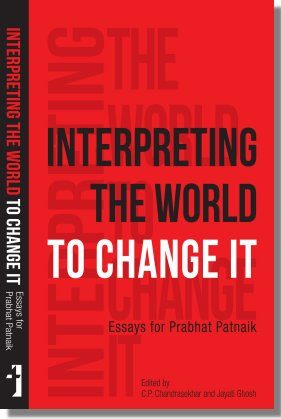Budget 2017-18: The Macroeconomic Perspective C. P. Chandrasekhar
Even for those sceptical about the government’s declared policy intentions—varying from cleaning the Ganga to doubling farmers’ incomes by 2022—the subdued and insubstantial Budget 2017-18 was a surprise. The circumstances in which the Budget was presented were exceptional. In the midst of a slowdown in growth with signs of the onset of deflation[i], the government had chosen to withdraw and declare worthless more than 80 per cent of the value of currency in circulation by demonetising “higher value” notes. But new notes to replace the ones withdrawn were slow in coming and had to be rationed, because the indefensible measure…
Marital Breakdown in India C.P. Chandrasekhar and Jayati Ghosh
Although divorce rates are low in India, separation is the dominant form of marital dissolution, and this is especially problematic for women because of the uncertain legal status and lack of rights. Marital_Breakdown_India (Download the full text in PDF format) (This article was originally published in the Business Line on February 27, 2017)
Budget 2017-18: Blinded by neoliberalism C. P. Chandrasekhar
In an insipid speech that was repeatedly misread, Finance Minister Arun Jaitley presented on 1 February the contours of a budget that was shockingly short of substance. It left disappointed those who expected that policies to compensate sections hurt by the demonetisation experiment would be included and those who were looking for some measures to counter the demand slump afflicting the economy that had been aggravated by the demonetisation. It also surprised those who thought that the budget would be forced to expand aggregate expenditure and social spending to win voter support in the elections to the five assembly elections…
Interpreting the World to Change it Essays for Prabhat Patnaik; edited by C.P. Chandrasekhar and Jayati Ghosh
February 2017 • 6.25 x 9.5 inches • (xvi+284) 300 pages • Hardback • ISBN: 978-93-82381-93-8 • Rs 850 Prabhat Patnaik’s academic insights and strong political commitment have stimulated intellectual activity and inspired personal regard across a multitude of people from all walks of life. This volume brings together contributions from some who have benefited from interaction with him over decades, in a tribute and continuing conversation. Prabhat Patnaik, born 19 September 1945 in Odisha, India, is one of the outstanding economists of his generation and a leading Marxist theoretician in the world today. Versatile in his knowledge and mastery…
Bond Market Reversal C. P. Chandrasekhar and Jayati Ghosh
Post-Trump expectations of a shift back from an easy monetary policy with low interest rates to reliance on a fiscal stimulus for growth are reversing trends in global bond markets. Bond_Market_Reversal (Download the full text in PDF format) * This article was originally published in the Business Line on February 13, 2017
Power: The web of debt C. P. Chandrasekhar
The state of Jharkhand has reportedly stopped payments to the Damodar Valley Corporation (DVC) for the 700 MW of power the later supplies it every day. The evident reason is that it has not been able to cover payments for the power it acquires from the generators and supplies to its customers, resulting in deficits that are covered with debt that it is no longer able to service. A consequence of this would be an inability to purchase power from the generators, increasing their losses and affecting the debt they in turn owe the banks. With this debt being a…
Spreading Light: Are the Modi government’s electricity promises being fulfilled? C.P. Chandrasekhar and Jayati Ghosh
The government's claim that it has ensured electricity for all does not seem to be warranted by the evidence. Spreading_Light (Download the full text in PDF format) (This article was originally published in the Business Line on January 30, 2017.)
China’s Capital Flight Syndrome C.P. Chandrasekhar
China, now one of the world’s two largest nations measured by gross domestic product (GDP), is displaying a strange malady. A sudden and large outflow of capital from the country is resulting in a sharp fall in its reserves. Going by International Monetary Fund (IMF) statistics, between the quarter ending June 2014 and the one ending June 2016, China’s foreign exchange reserves fell by $752 billion, from $4.1 trillion to $3.3 trillion. According to recent reports, reserves had fallen further to $3.1 trillion by the end of October 2016. This collapse in reserves due to an outflow of capital is…
No Digital Base for a Cashless Economy C.P. Chandrasekhar
Prime Minister Modi is selling the idea that the engineered cash shortage that resulted from the disastrous demonetisation exercise is an opportunity to force-march India to being what is inelegantly termed a “less cash” society. In his view, that transition, if ensured, would for some inexplicable reason tame the rich and reward the poor. This new sloganeering of the Prime Minister and his government has given the “Digital India” mission a whole new dimension, with electronically-executed financial transactions and settlements becoming a means to realising larger economic and social objectives. Making this an immediate, or even medium term, objective is…
Trump’s Protectionist Charade C. P. Chandrasekhar
As January 20th, the day Donald Trump assumes his Presidency nears, the fear that he would turn US trade policy in a protectionist direction appears to increase. Protection against import competition and an attack on global relocation and outsourcing by American firms that are seen as destroying jobs in the US and immigration that is viewed as depriving the American working class of available livelihoods were central elements of the populist rhetoric that swung the white working class in Trump’s favour. Key items in Trump’s election campaign promise list were policies to recapture American jobs by clamping down on the…

